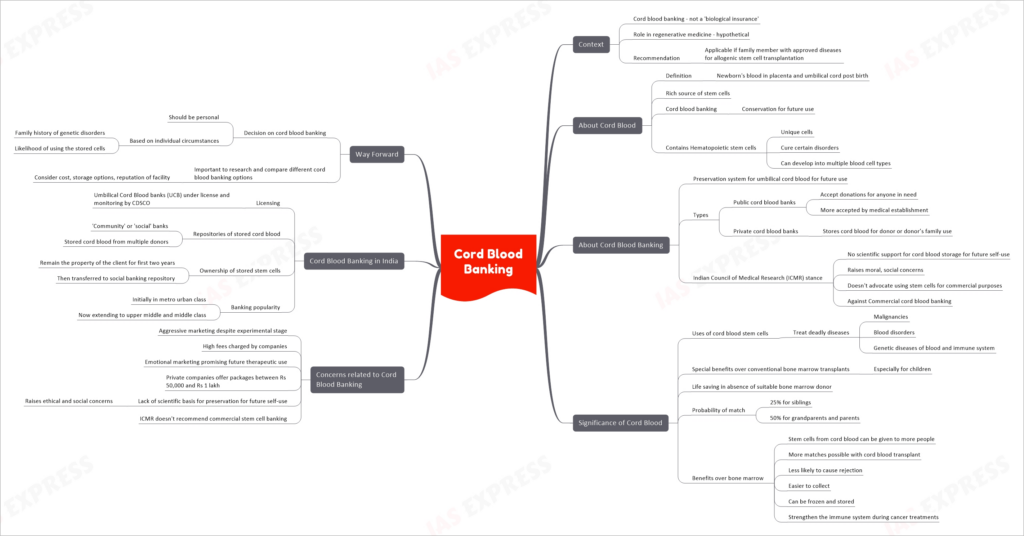Cord Blood Banking in India: Concerns & Way Forward

From Current Affairs Notes for UPSC » Editorials & In-depths » This topic
IAS EXPRESS Vs UPSC Prelims 2024: 80+ questions reflected
In recent years, the concept of cord blood banking has gained attention as a potential resource for regenerative medicine. However, it is essential to reevaluate the significance of cord blood and its role in medical treatments. This article will explore the various aspects of cord blood banking, including its definition, types, uses, concerns, and the Indian perspective. By examining these factors, we can better understand the implications of cord blood banking in the context of regenerative medicine.
About Cord Blood
Cord blood refers to the blood found in the placenta and umbilical cord after the birth of a newborn. It is a rich source of stem cells, specifically hematopoietic stem cells. These unique cells have the ability to cure certain disorders and can develop into multiple types of blood cells. Cord blood banking involves the preservation of this blood for potential future use.
About Cord Blood Banking
Cord blood banking provides a system for the preservation of umbilical cord blood. There are two main types of cord blood banks: public cord blood banks and private cord blood banks. Public cord blood banks accept donations and store the cord blood for anyone in need, making it more widely accepted by the medical establishment. Private cord blood banks, on the other hand, store cord blood specifically for the use of the donor or the donor’s family.
The Indian Council of Medical Research (ICMR) has taken a stance against the concept of cord blood storage for future self-use. They argue that there is no scientific support for this practice and raise moral and social concerns. The ICMR does not advocate using stem cells for commercial purposes and discourages commercial cord blood banking.
Significance of Cord Blood
Cord blood stem cells have the potential to treat various deadly diseases, including malignancies, blood disorders, and genetic diseases of the blood and immune system. They offer unique benefits over conventional bone marrow transplants, particularly in the case of children. Cord blood can be a life-saving option when a suitable bone marrow donor is not available.
One significant advantage of cord blood is the higher probability of finding a match within the family. Siblings have a 25% chance of being a match, while grandparents and parents have a 50% chance. Moreover, cord blood can be given to more people, leading to a greater number of potential matches compared to bone marrow transplants. Additionally, cord blood is less likely to cause rejection, can be easily collected, and can be frozen and stored for future use. It has also been found to strengthen the immune system during cancer treatments.
Concerns related to Cord Blood Banking
Despite the potential benefits, there are concerns associated with cord blood banking. Aggressive marketing campaigns by private companies, despite the experimental stage of the procedure, raise ethical questions. These companies often charge high fees and make emotional promises about future therapeutic use, even though there is no scientific basis for preserving cord blood for self-use.
The ICMR does not recommend commercial stem cell banking and highlights the ethical and social concerns surrounding this practice. It is crucial to critically evaluate the claims made by private companies and consider the lack of scientific evidence supporting the preservation of cord blood for future self-use.
Cord Blood Banking in India
In India, umbilical cord blood banks (UCB) operate under licenses and are monitored by the Central Drugs Standard Control Organization (CDSCO). There are two types of cord blood banks in India: community or social banks, and private banks. Community banks store cord blood from multiple donors, while private banks store it for individual families.
Initially, cord blood banking gained popularity among the metro urban class in India, but it is now extending to the upper middle and middle classes as well.
Way Forward
The decision on cord blood banking should be a personal one based on individual circumstances. Factors to consider include family history of genetic disorders and the likelihood of using the stored cells in the future. It is essential to thoroughly research and compare different cord blood banking options, considering aspects such as cost, storage options, and the reputation of the facility.
In conclusion, while cord blood banking holds potential in regenerative medicine, it is crucial to reassess its importance and weigh the benefits against the ethical and scientific concerns. It is recommended that individuals make informed decisions based on their specific circumstances and consult with medical professionals when considering cord blood banking for potential future use.
If you like this post, please share your feedback in the comments section below so that we will upload more posts like this.

